- News
- Reviews
- Bikes
- Components
- Bar tape & grips
- Bottom brackets
- Brake & gear cables
- Brake & STI levers
- Brake pads & spares
- Brakes
- Cassettes & freewheels
- Chains
- Chainsets & chainrings
- Derailleurs - front
- Derailleurs - rear
- Forks
- Gear levers & shifters
- Groupsets
- Handlebars & extensions
- Headsets
- Hubs
- Inner tubes
- Pedals
- Quick releases & skewers
- Saddles
- Seatposts
- Stems
- Wheels
- Tyres
- Tubeless valves
- Accessories
- Accessories - misc
- Computer mounts
- Bags
- Bar ends
- Bike bags & cases
- Bottle cages
- Bottles
- Cameras
- Car racks
- Child seats
- Computers
- Glasses
- GPS units
- Helmets
- Lights - front
- Lights - rear
- Lights - sets
- Locks
- Mirrors
- Mudguards
- Racks
- Pumps & CO2 inflators
- Puncture kits
- Reflectives
- Smart watches
- Stands and racks
- Trailers
- Clothing
- Health, fitness and nutrition
- Tools and workshop
- Miscellaneous
- Buyers Guides
- Features
- Forum
- Recommends
- Podcast
feature
Staff bikes: Jamie's 2022 Specialized Allez Sprint dream build
In our latest edition of staff bikes, I (Jamie) take you through my new build that will be starring in crit races and upcoming YouTube videos alike (hopefully, the videos will be more successful than my crit racing to date!) There are some interesting component choices to talk through, including Magura brake callipers and a custom 3D-printed part...
You may have already spotted the new Allez in a recent build video (above), and now the final touches have been made, so here it is!
Aluminium bikes are back in business, if they ever went away (just don't tell Steve Thomas)... and the 2022 Specialized Allez Sprint is dubbed as an alloy superbike.
When we tested the Comp build of the bike, we were mightily impressed by the snappy handling and racey geometry. This is all too often lost on alloy bikes, as they sit further down the range than their carbon counterparts.
> Specialized Allez Sprint Comp 2022 review
All of this (and a good deal) was enough to make me overlook those rather scruffy-looking welds and spend my own hard-earned dosh on a 54cm frame in the Chameleon colour scheme.
The beady-eyed amongst you might have noticed that I should, according to the Specialized's size guide, be riding a 56cm frame; but with the seatpost near its minimum insertion point and a nice long stem fitted, I much prefer the feel and aesthetic of a smaller frame. You'll also find many of the pros doing the same in order to get a smaller headtube (I am absolutely not a pro, to clarify).
Anyone looking to purchase a new frame should also consider the hidden cost of all the little bits you'll need. It turns out that Specialized - I assume to cut costs and waste - now supplies frames with very little. There are no grommets for Shimano Di2 and the SL7 stem doesn't ship with the cable clip that screws to the underside, To give two examples.
We'll get all the moans about Specialized out the way early: why oh why aren't the parts to integrate the front end made commercially available? When the bike was released it was the first thing that sponsored team Legion did, and the first thing that I, along with many others wanted to do (the original set-up is shown below with mechanical gearing).
Specialized found the best of both worlds regarding integration on the SL7, tucking the hoses out of the way but allowing stem changes and bar removal without fully re-hosing the bike.
Specialized also did all the hard work on the Allez, channelling the hoses down through the frame and using oversized headset bearings, but missed the final step for riders wanting to use electronic gears (i.e the majority). To add insult to injury the four-hole headset cap that ships with the Allez frame is heavily optimised for euro/US setups, where the left shifter goes to the rear brake, compromising cable run when set up UK-style.
Luckily, the solution really is very simple... even I can do it! Run an SL7 stem with cable/hose guide underneath and use an aftermarket headset cap. This meant I set about 3D-printing one for myself, but since then they have popped up online, such as this one from Raceware.
The front end is completed by a pair of Pro Vibe Aero Alloy bars and Shimano Ultegra R8070 Di2 shifters. Carbon bars can improve ride comfort but for racing, many riders prefer alloy for impact protection and lower cost.
This is an 11-speed groupset for maximum compatibility with my other bikes, and as most of the wheels we get in to test have an 11-speed freehub body, it means that these can be set up with minimal faffing.
I've also stuck with the Kinesis no slip reflective Jo Burt tape just like on the Lauf Seigla. I like the looks, but it's also impressed me with its grip in both dry and wet conditions.
I tend to reverse-wrap my bars, starting at the centre and working down to the drops. Wolftooth bar plugs are still present, which are designed for both mtb and road bars but seem a bit loose in this particular bar.
Moving on to the rest of the groupset, much of it is Ultegra R8070 but with Quarq DFour 91 cranks. I find this an extremely reliable power meter, and fitted to them I have 53/36T chainrings. It's not a standard set-up but one that I've found gives me a greater range of gears without compromising the steps in between gears or shifting.
Other changes include a Sigeyi direct-mount mech hangar and a Sram XG1190 cassette. The chain is a Dura-Ace R9100 with Silca hot melt wax to prolong its life, which I will be publishing a review of very soon; in fact, I have quite a few things to review! These Hunt 60 Limitless carbon spoke wheels, for example, impressed us in our latest wheels testing video and are super wide to aid stability. Oh, and the saddle is also on review. It's a Fizik Vento Argo R3 Adaptive and is 3D-printed to offer tuned compliance in different areas.
Other drivetrain components include Enduro Bearing's new XD-15 DUB bottom bracket and ceramic jockey wheels. These don't come cheap but do offer a lifetime warranty; hopefully that won't be needed while I take on this road salt season.
Now my favourite bit, these Magura MT8 SL FM callipers which are lighter than the Shimano counterpart and have funky-coloured Iris titanium screws mounting them to the frame, and the Torx head on the pad retaining pin prevents it from rounding off. These are borrowed from the world of off.road.cc, where using Magura callipers and Shimano shifters is much more common. It even has a name: Shigura.
These are set up using Magura hoses, but when it comes to this sort of thing online forums are your friend! I've found these to work excellent with the MT900 XTR rotors (160mm front/140mm rear) with no rubbing and consistent, powerful braking.
Finally, we have a bit of a bodge. My Chinese copy bottle cage likes to eject bottles at the most inconvenient moment, and behave much better with borrowed hairbands! Elite Leggero bottle cages are on order, which are my personal favourites and yet to let me down.
The full build spec and total weight can be found below:
- Weight as seen: 7.98kg (not super light unfortunately!)
- 54cm 2022 Allez Sprint Frame (Chameleon Oil tint/Black)
- Hunt Limitless 60 UD carbon spoke
- Panaracer Agilist tubeless tyres (30mm)
- Shimano Ultegra R8070 Di2 groupset
- Magura MT8 SL FM brake callipers
- Specialized Sl7 stem (130mm/-12deg)
- Pro Vibe alloy aero handlebar (40cm)
- Custom 3d printed headset spacer cap
- Kinesis Jo Burt No Slip Reflective bar tape
- Wolftooth bar plugs
- Shimano Ultegra R8000 pedals
- Fizik Vento Argo R3 Adaptive saddle
- Quarq DFour DUB power cranks (170mm)
- Dura-Ace 53/36T chainrings
- Dura-Ace R9100 chain
- Shimano MT900 XTR brake rotors (160/140mm)
- Sigeyi direct mount mech hangar
- Peatys X Chris King tubeless valves (80mm)
- Sram XG1190 11/28 Cassette
What components would you switch out, or which frame would you have chosen instead? Let us know in the comments section below. Don't be shy, I have thick skin...
Jamie has been riding bikes since a tender age but really caught the bug for racing and reviewing whilst studying towards a master's in Mechanical engineering at Swansea University. Having graduated, he decided he really quite liked working with bikes and is now a full-time addition to the road.cc team. When not writing about tech news or working on the Youtube channel, you can still find him racing local crits trying to cling on to his cat 2 licence...and missing every break going...
Latest Comments
- Hirsute 4 hours 39 min ago
Anyone vomiting whilst driving could have a detrimental effect on others....
- IanGlasgow 5 hours 42 min ago
Indicators for bikes are still with us. The best/least bad I've tried are:...
- IanGlasgow 5 hours 47 min ago
Indicators for bikes are still with us. The best/least bad I've tried are:...
- David9694 6 hours 47 min ago
I wonder what age that man will get to before it dawns on him what he is. ...
- Terry Hutt 7 hours 41 min ago
I was interested in the EasiCyco backpack until I watched their Kickstarter video. Both their riders' bums rub on the backpack. That's a hard NO...
- redhanded 10 hours 10 min ago
I had 2 bikes stolen from bike shed outside my flat in London last year. They ended up for sale in Russia. A cycling club I'm a member of tweeted...
- Deac 11 hours 11 min ago
I tried the footrest on the way home, it's a great idea, you can keep on the saddle making it easier to get away from the traffic lights, and being...
- ktache 14 hours 5 min ago
Not that they would be as technical, or maybe quite as grippy, but does the skate industry provide any solutions?
- Rendel Harris 14 hours 47 min ago
Sorry to be a killjoy but it doesn't amuse me at all, I hope the idiot gets caught and punished. Putting yourself on the same road as pros...
- willpom @GWRaudax 15 hours 22 min ago
Steve Poulton has just published The Cheltenham Flyer - 10th May https://www.audax.uk/event-details/calendar/13235-cheltenham_new_flyer_200
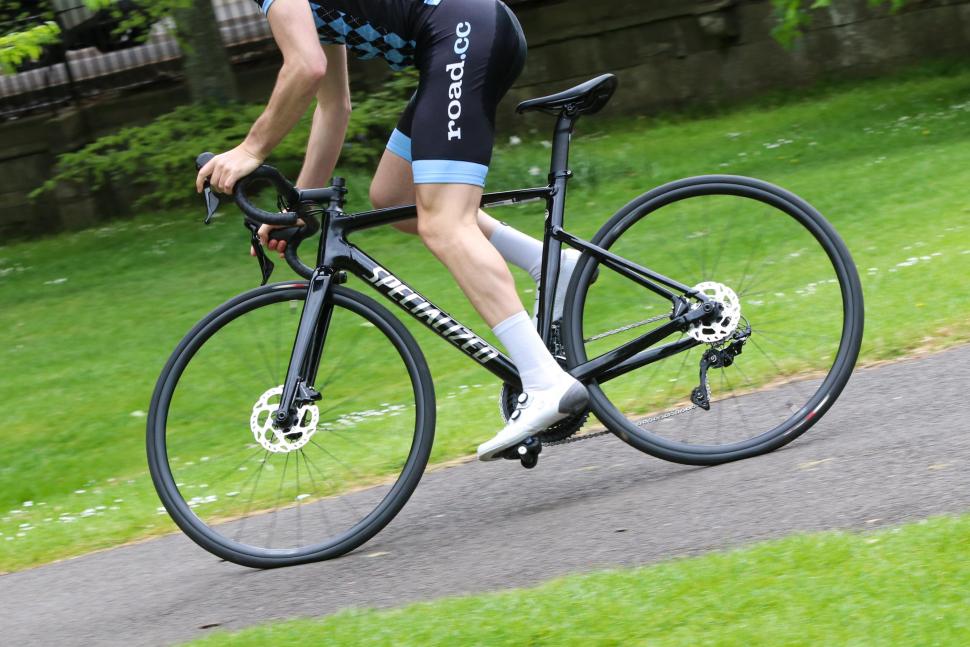
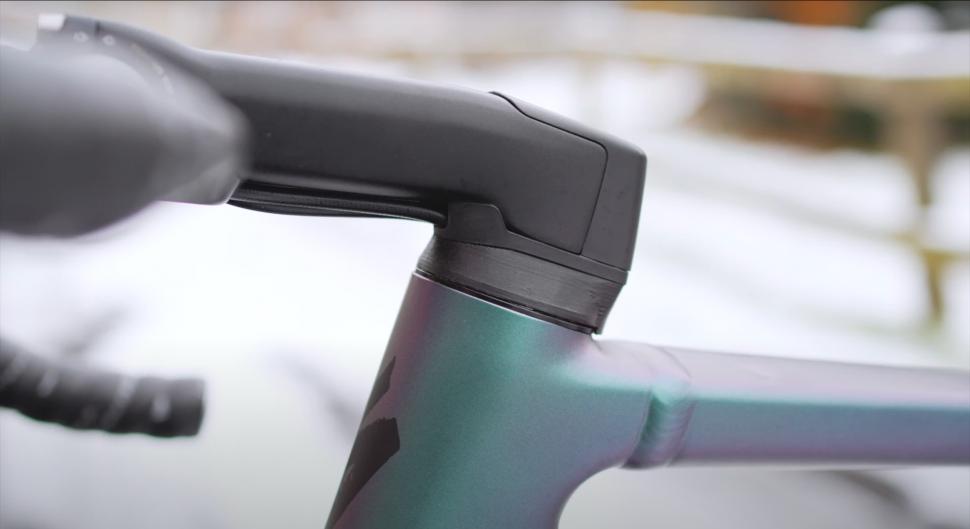
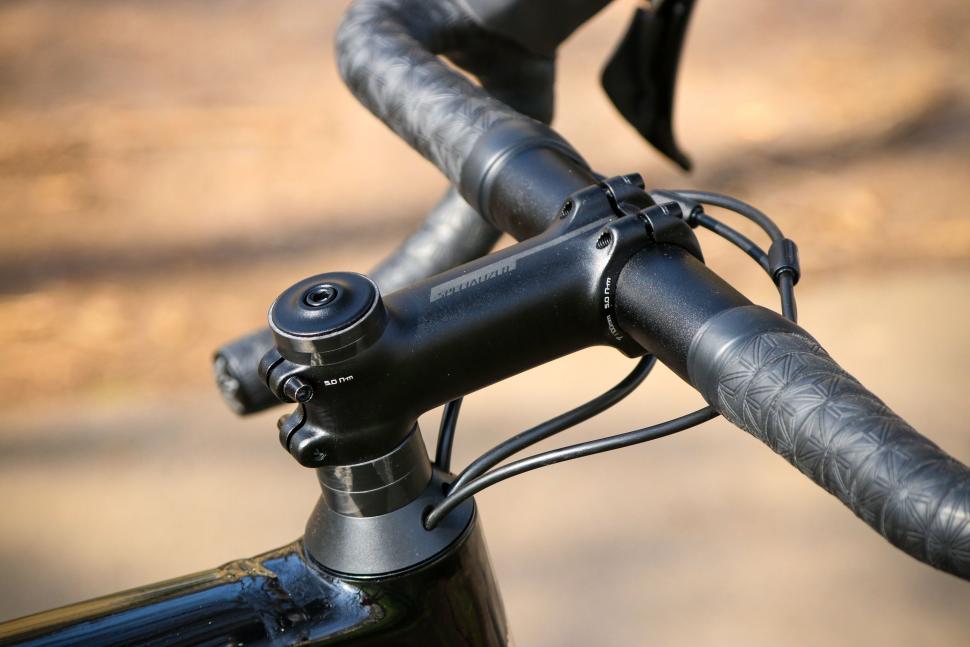
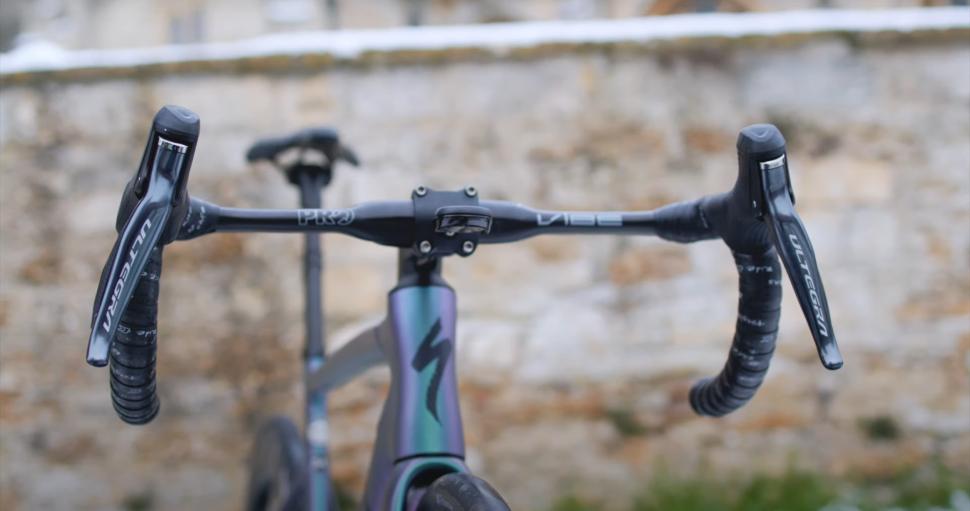
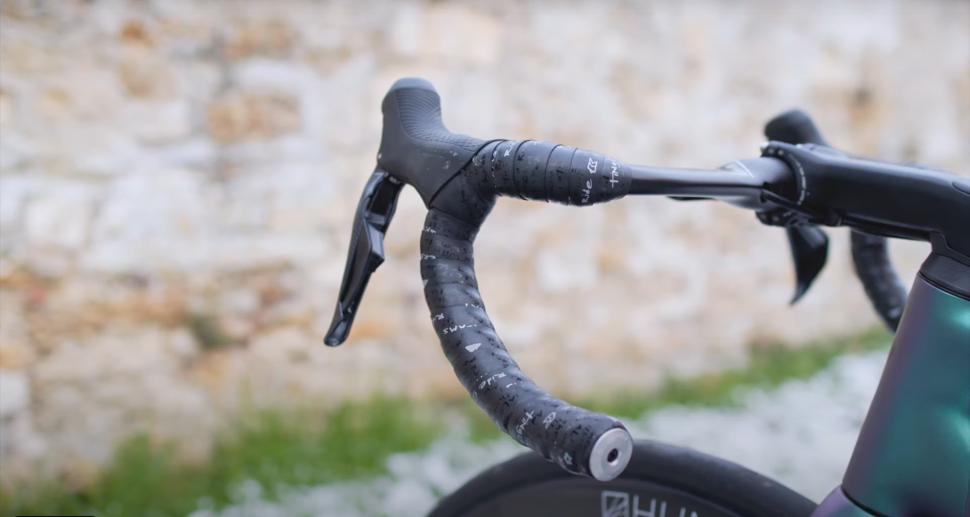
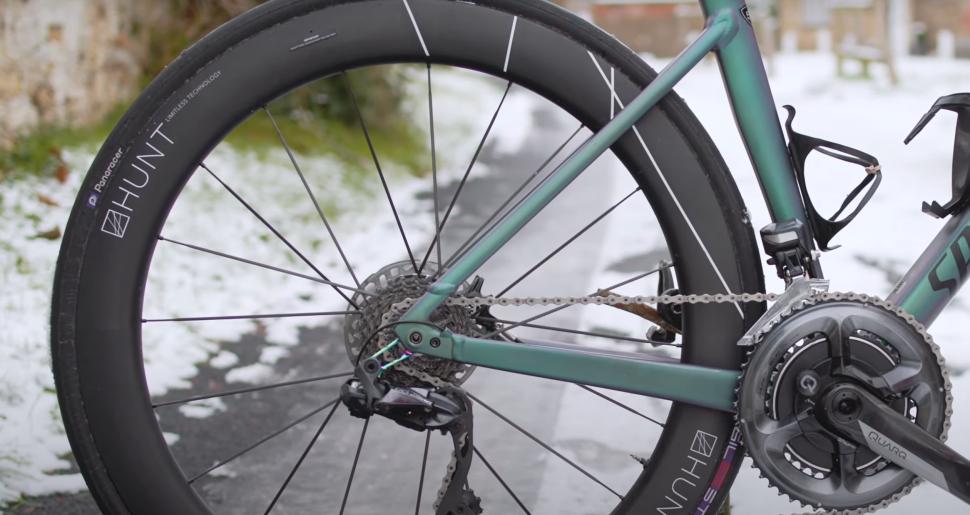

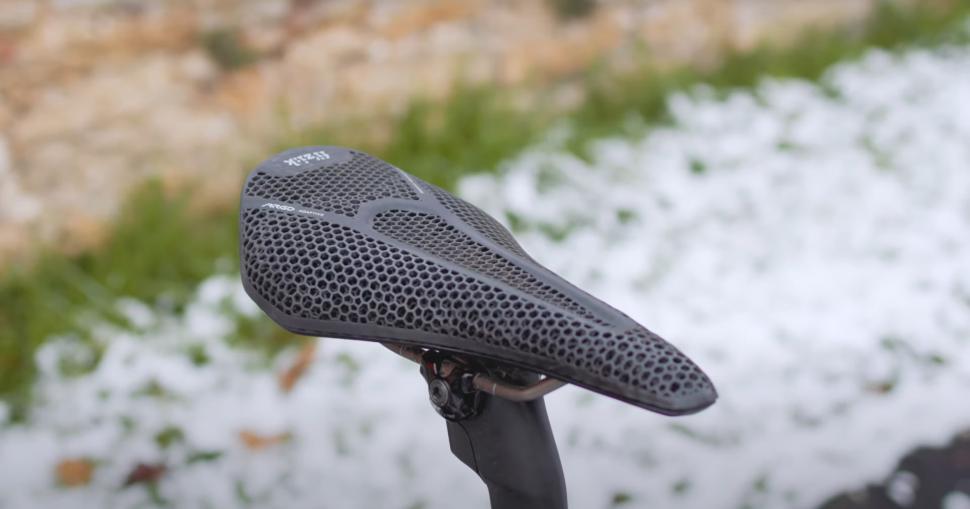


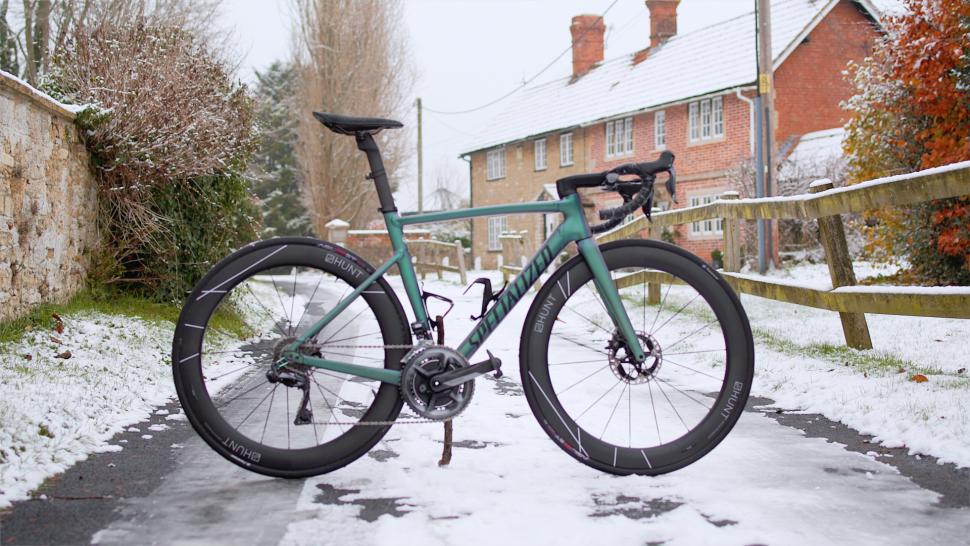
Add new comment
16 comments
Is there a reason for wrapping the bar tape down rather than up? Any benefit performance or aesthetically wise? Curious as I've never it before.
The main one I can see is that it removes the guess work about ending your tape in a symmetrical position on the bars. This is the bit I always screw up. I can figure of eight the shifters to avoid using the little offcut strips, but can I end the tape in the same place? Can I buggery!
There's so little tape on the tops I suspect it doesn't make much difference but the usual reason is that you get a cleaner cockpit with no finishing tape or trial and error cutting the taper to get the join to finish under the bar. You can also stuff a decent wedge of tape into the bar end which helps with end plug retention.
Back in the days of cloth tape and shellac it was more common to do it this way because the tape was thinner and you tended not to overlap it as much - it was there for grip, not for comfort.
If you want to get fancy with cloth tape and do a harlequin wrap then it's best to start at the stem and work outwards.
It looks very neat at the bit you see most - centre top - because you don't have to have manky insulation tape over the ends. The ends are secured by the bar plugs. It's the way bar tape used to be done in the 1970s.
Nice build. Mine's a rim brake version with a standard crankset, but Spesh made a 1x version which I reckon was spot-on for crit racing. Shame they only made it for one season.
"I have 53/39T chainrings. It's not a standard set-up..."
I assume you mean 53/36, as per the spec list? Hope so, makes me feel more comfortable with my non-standard 52/33 setup for the Alps.
I did indeed, now changed
I do wonder if you can grind those head tube welds down without impacting structural integrity. They really upset me, I can live with them elsewhere but the head tube region is fugly. Seems like a lot of extra material for a weld - I know there's some magic technology at work but still...
I might give it a few rides before finding that out...
It must be a great bike but yes these offset welds are horrible to see. I am quite sure that if the tube were super tapered on the inside of the tubes, grinding would be possible, but super labor intesive.
It would make the bike slightly heavier, but be more structurally sound to build up the area around the welds with filler, then finish and paint over.
My 2012 Triban 3 has better welds 😔 Why do Specialized put the frame together like this?
They did give a reason at the launch, something along the lines of moving the welds away from the stressed area of the head tube.
But then you have to factor in that Specialized are in fact a marketing company that also happens to sell bikes & accessories.
I've broken three frames in my life, and two of them broke at the down tube, close to the shift lever lever bosses (which gives you an idea of how long ago that was). That makes me suspect that a lot of the down tube is quite highly stressed.
I wonder if some of the advantage of this from Specialized's point of view is easier access to make the welds, which probably saves money in fabrication. Assuming they have the manufacturing volumes to make the elaborate "head tube with two stubs" component cost-effectively.
I'm presuming the whole head tube assembly is cast - which is pretty cheap even if theres a casting per bike size. Possibly machined afterwards but that would put the cost and wastage up more.
Yeah, I can't see beyond them. It just makes the bike look like it's been assembled in three chunks, part of the problem for me is that the welds on the TT and DT line up. Everything else lovely - stunning paintjob - but, er, no.